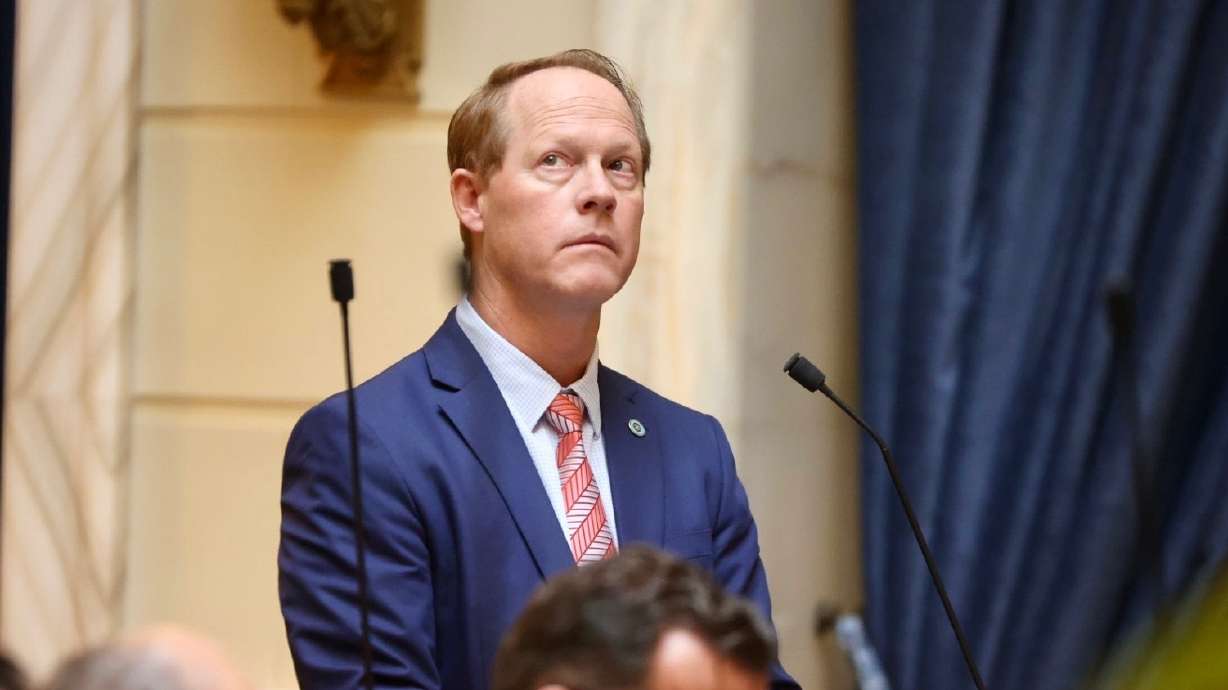Estimated read time: 3-4 minutes
This archived news story is available only for your personal, non-commercial use. Information in the story may be outdated or superseded by additional information. Reading or replaying the story in its archived form does not constitute a republication of the story.
SALT LAKE CITY — The Utah Senate has approved the controversial measure revamping diversity, equity and inclusion programs in the state as the change quickly courses through the Legislature on its way to becoming law.
Senators gave HB261 a green light in a 23-6 party-line vote on Thursday. Now, the heavily debated measure returns to the House for consideration due to a number of changes and clarifications made in the Senate. Presuming approval in the House — which overwhelmingly supported the earlier version of the measure, also along partisan lines — it would then go to Gov. Spencer Cox to be signed into law.
Sen. Keith Grover, R-Provo, the bill's Senate sponsor, reiterated changes that would be brought about by the bill, coming amid increased criticism from conservatives across the nation directed at diversity, equity and inclusion initiatives on university campuses and elsewhere.
"It ensures academic freedom (on) university campuses, where all voices will be heard. And it does implement student success centers that will promote equality of opportunity for everyone," he said. The measure would also prohibit universities and other government employers from asking job seekers for "diversity statements," meant to gauge an applicants' sentiments toward diversity, equity and inclusion efforts.
Beyond Grover's comments, the bulk of the discussion on the Senate floor Thursday came from Democrats critical of HB261. The 23 "yes" votes came from the Republican senators, while the six Democrats on the body voted against the measure.
"I hear a lot about (how) this bill is lifting all. But it feels like it's erasing some, and their history," said Sen. Luz Escamilla, D-Salt Lake City.
The measure would broaden the scope of diversity, equity and inclusion initiatives on public college campuses and in other public entities for students of color and other traditionally marginalized communities to white and other students. That's a sticking point for some critics, who maintain certain minority students need focused attention to help them thrive in a college setting and achieve a sense of belonging.
"This legislation if enacted eliminates these vital support systems designed to increase access and assist students who traditionally face these greater challenges," said Sen. Karen Kwan, D-Murray. "What a shame it would be that we would lose our ability to help all of our students feel as if they belong."
HB261 boosters have said cultural centers on university campuses, organizations and offices geared to certain subgroups of students would not be threatened by the bill. Kwan, though, has her doubts.
"I worry that if students of color get to school and they see that they no longer have a dedicated space with culturally competent staff to help them, that that's all they'll know about the bill — that we took away ... what to many students is their only safe space," she said. The measure "risks dismantling essential support systems and creating a void for students who rely on these safe spaces."
Among the amendments to HB261 was the addition of language meant to preserve the ability of health care officials to gather information on diseases and other ailments that may disproportionately impact certain racial or ethnic groups. Critics had feared such information gathering would be prohibited, hampering efforts to address health issues that impact some demographic groups more than others.
The "academic freedom" provisions of HB261 stem from concerns among conservatives that conservative voices can be drowned out in a university setting. Among other things, the measure states universities and other impacted institutions must provide specialized training to faculty and staff on free speech issues. What's more, universities and other impacted entities must create plans on inviting guest speakers "to promote viewpoint diversity," also aimed at concerns of conservatives that their voices aren't sufficiently heard on college campuses.
The debate over HB261, like HB257, has been quick. The 2024 legislative session started just last week and the two measures have quickly garnered support from the GOP-dominated Legislature, though Democrats have rebuffed both proposals. HB257, another controversial measure, puts limits on the public bathrooms, changing rooms and locker rooms that certain transgender people may use.









